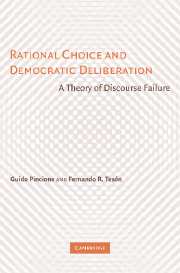Book contents
- Frontmatter
- Contents
- Preface
- Acknowledgments
- 1 Introduction
- 2 The Epistemic Argument for Deliberation
- 3 The Rational Choice Framework
- 4 The Resilience of Discourse Failure
- 5 Symbolism in Political Argument
- 6 Discourse Failure and Political Morality
- 7 Non-Epistemic Defenses of Deliberation
- 8 Deliberation, Consent, and Majority Rule
- 9 Overcoming Discourse Failure: Voluntary Communities
- Index
7 - Non-Epistemic Defenses of Deliberation
Published online by Cambridge University Press: 05 May 2010
- Frontmatter
- Contents
- Preface
- Acknowledgments
- 1 Introduction
- 2 The Epistemic Argument for Deliberation
- 3 The Rational Choice Framework
- 4 The Resilience of Discourse Failure
- 5 Symbolism in Political Argument
- 6 Discourse Failure and Political Morality
- 7 Non-Epistemic Defenses of Deliberation
- 8 Deliberation, Consent, and Majority Rule
- 9 Overcoming Discourse Failure: Voluntary Communities
- Index
Summary
Deliberation as the Exercise of Autonomy
Theorists of deliberative democracy do not rely solely on the supposed epistemic virtues of deliberation. In this chapter we examine various non-epistemic defenses of deliberation. We will see that they are overly optimistic. Deliberation may be a valuable practice, but not in the institutional milieu assumed by deliberativists – to wit, majority rule cum wide redistributive powers. (We outline in Chapter 9 the institutional arrangements that hold out hope of overcoming discourse failure.)
Political deliberation can be defended by appeal to Kantian ideals. There is surely independent value in people's thinking about moral matters for themselves. We enrich our individual moral reflection (our moral soliloquy, as it were) when we deliberate with others. Public deliberation is, on this view, the extension to the political realm of a valuable – indeed, central – human faculty. This argument is particularly eloquent against Platonic criticisms to democracy, because it precludes reliance on moral experts or philosopher-kings. Contrast this with science. For most of us most of the time, there is not much independent value in trying to figure out scientific matters by ourselves: We do well in deferring to doctors, physicists, and so forth. Moreover, it is ludicrous to expect to solve scientific problems by submitting them to massive deliberation. We do expect citizens, however, to reflect upon right and wrong, not because we think they are better judges of moral certitude than professional philosophers but because reflection is a morally valuable practice.
- Type
- Chapter
- Information
- Rational Choice and Democratic DeliberationA Theory of Discourse Failure, pp. 183 - 203Publisher: Cambridge University PressPrint publication year: 2006



